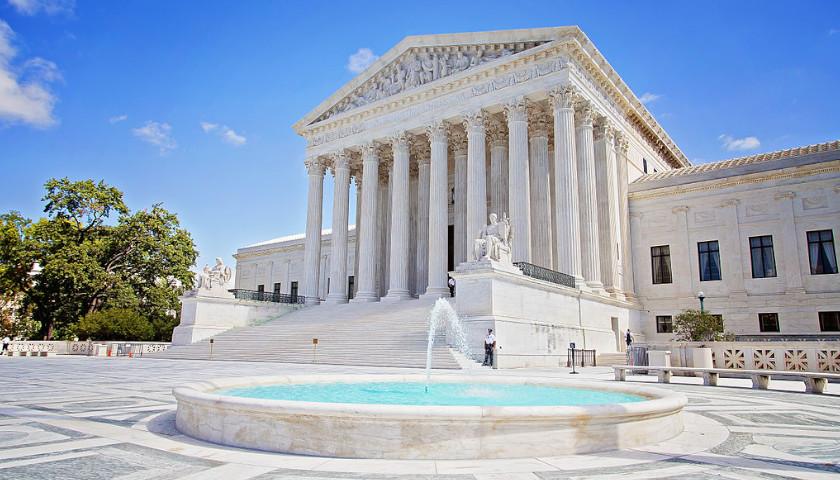Live from Music Row, Monday morning on The Tennessee Star Report with Michael Patrick Leahy – broadcast on Nashville’s Talk Radio 98.3 and 1510 WLAC weekdays from 5:00 a.m. to 8:00 a.m. – host Leahy welcomed the new Tennessee AG Jonathan Skrmetti in studio to discuss his background and the administrative state, usurpations of power, rights for the states, and rights for the individual.
Leahy: We are not doing News Potpourri today. And the reason is because in-studio, the Attorney General of the state of Tennessee, Mr. Jonathan Skrmetti, is here. Welcome.
Skrmetti: Good morning. Thank you for having me.
Leahy: It’s a delight to have you here. And congratulations on being named by the Tennessee Supreme Court as the attorney general for the state of Tennessee. It’s an eight-year term.
Skrmetti: Yes, sir.
Leahy: And you were sworn in on September 1st?
Skrmetti: I was. So we’re over two weeks in now.
Leahy: Well, what are these two weeks been like?
Skrmetti: They’ve been really busy. It’s been good to get back to the attorney general’s office. I worked there for about three years as the chief deputy attorney general, and the office covers a very, very wide range of legal issues representing the state and all sorts of matters both defensive and proactive.
And, in part I had forgotten how busy it was, and in part I’ve learned about parts of the office that I just didn’t really deal with in my prior job.
So it’s been very educational and just a great opportunity to serve. I love the people over there. I love the state, and there are a lot of good fights worth fighting.
Leahy: And you are a very distinguished attorney, a graduate of Harvard Law School.
Skrmetti: Still paying for it. Yes, sir. (Laughter)
Leahy: Where are you from originally?
Skrmetti: I grew up in Connecticut. My dad moved up from Biloxi with the Navy. My mom moved down from Massachusetts, and I spent my childhood in Mystic, Connecticut, near the base.
Leahy: Mystic, Connecticut. In-studio with us. Also Braden Boucek who is the senior litigator with the Southeastern Legal Foundation. Did I get that right?
Boucek: You got it great. Perfect, thanks. Great to be in-studio.
Leahy: All right, well, it’s great to have you here, and you are doing a lot of legal work yourself. And tell us a little bit about what you’re doing on Title IX.
Boucek: Southeastern Legal Foundation recently filed comments regarding President Biden’s effort to roll back gender equality decades by redefining sex to include gender and gender identity, as well as sexual orientation.
We’re very excited, because we know a lot of states are moving into this space as well, and we look forward to the opportunities to be in alignment with various politically aligned states. We’re very excited about Jonathan Skrmetti being at the AG’s office as well. Jonathan and I go way back.
Leahy: Well, let’s just say this. Let us be completely transparent and honest with our audience. We at The Tennessee Star Report and The Tennessee Star are very excited to have Jonathan Skrmetti as our Attorney General, because I think you’re a very strong conservative.
And let me ask the broader question here. Crom Carmichael and I have talked about this often. Right now, there are huge usurpations of power, rights for the states, and rights for the individual that the Biden administration is engaging in with the Department of Justice and the out-of-control regulatory state – the administrative state.
And it seems to me that there is no job more important than to be the attorney general for a state that strongly supports the rights of the states against the federal government. Do you see it that way as well?
Skrmetti: I do. I think separation of powers is the single most fundamental concept to our system of government. And that applies not just to separation of powers between the three branches of government at both the federal and state levels, but between the state and federal governments.
Any time that you have a concentration of power and the opportunity for one person or a small group of people to make decisions, there’s a risk of tyranny. There’s an inherent risk of tyranny. Our founders recognized that. They articulated it very clearly.
And that’s why we have a pretty elaborate and deliberately inefficient system for making changes in the law. You need to spread the power around. You need to make sure that no one person or no small group is able to arbitrarily change things.
And the rise of the administrative state has created a unique threat to that separation of powers. This is not a new threat. People were complaining about it back when this all started happening, especially around the New Deal.
They foresaw some of the problems that would come, and by and large America went along with the changes because of the efficiency involved and because of, I think, a decreasing understanding of civics.
So over time, American understanding of the importance of separation of powers, of the importance of our institutions and why they were constructed the way they are, has fallen off a cliff. And as fewer people are able to provide an informed check on these systems, the administrative state’s been able to grow at an incredible pace.
And so you end up with situations where people who feel very strongly that the law should be different, opt for an end run and try to just rewrite the law through the regulatory process rather than pursuing the legislative process, building the national consensus, persuading people who think differently than them.
And instead, you have them out there taking a shortcut, as President Obama described it, a pen and a phone. And we’re seeing more and more of that.
Leahy: Now, there are so many from my view, and from Crom’s view as well, there are so many federal usurpations. How do you go about deciding which cases you’re going to take up to sue the federal government on?
I think, for me, there are probably like 1,000 cases that I could file. In your situation, how do you do that? How do you prioritize what’s most important?
Skrmetti: First of all, let me say there are resource constraints on it and if I had more resources, I would be looking at more suits. But right now, given where we’re at, I think the biggest indicator of where to file suit is where the elected branches of government are. So, on issues that the legislature and the governor care a lot about.
I’m an appointed attorney general. It’s not up to me to say, this is the policy of the state of Tennessee. It’s my job to get into court and represent what the policymakers have decided. And so on an issue like Title IX, where we’ve had multiple pieces of legislation, where we’ve had significant policy pronouncements from both the executive and legislative branches, it’s clear that this is something that matters a lot to Tennessee.
It’s obvious, looking at the law, that there are a number of questions here that are properly determined by the states and not the federal government. And so this seemed to be a particularly egregious instance of federal overreach dealing with something that matters a lot.
I try to look at the magnitude of the intrusion and the centrality of the policy issues at question to the functioning of Tennessee. But I am still fairly new at this.
I’m sure there will be a number of issues that come up in the near future, and I’m still talking with the elected leaders of Tennessee to make sure I’m getting feedback from them about what their priorities are in terms of affirmative litigation.
Leahy: There’s been in the past, perhaps, not as much communication between the Tennessee General Assembly and the attorney general’s office. It seems to me that you’re making that communication a key focus under your tenure.
Skrmetti: I think it’s important. We have an elected legislature that’s particularly powerful structurally, compared to other states, and the attorney general’s office represents them, as well as the executive branch and the judicial branch.
We represent all three branches of state government, and the legislature cares a lot about the issues that attorneys general across the country are looking at, and they’re hungry for that communication.
I think it’s important to make sure that all the stakeholders in Tennessee government receive the opportunity to have input, to get feedback. I think better communication is critical, in large part because this is an appointed and not an elected office.
Listen to today’s show highlights, including this interview:
– – –
Tune in weekdays from 5:00 – 8:00 a.m. to The Tennessee Star Report with Michael Patrick Leahy on Talk Radio 98.3 FM WLAC 1510. Listen online at iHeart Radio.






You right-wingers are fine ones to talk about tyranny!